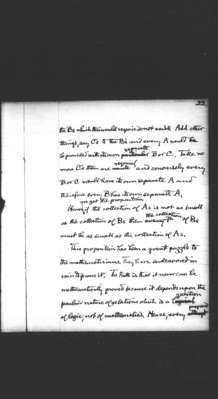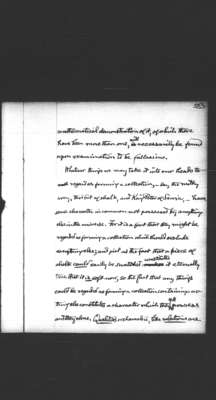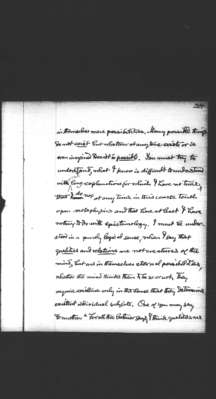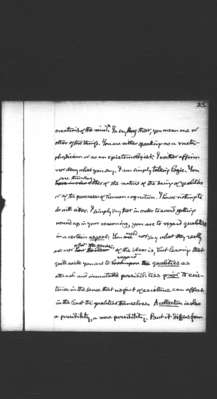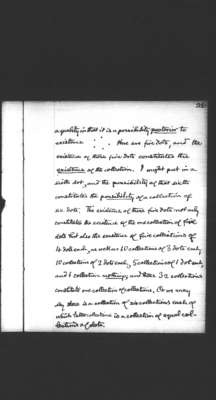Pages
26
22
the Bs which this would require do not exist. Add other things, say Cs to the Bs and every A would be provided with its own particular separate B or C. Take no more Cs than are required, and conversely every B or C would have its own separate A and therefore every B has its own separate A.
Hence we get the proposition if the collection of As is not as small as the collection of Bs then the collection of Bs must be as small as the collection of As.
This proposition has been a great puzzle to the mathematicians. They have endeavored in vain to prove it. The truth is that it never can be mathematically proved because it depends upon the peculiar nature of relations which is a question of logic, not of mathematics. Hence, every proposed
27
23
mathematical demonstration of it, of which there have been more than one, will necessarily be found upon examination to be fallacious.
Whatever things we may take it into our heads to regard as forming a collection,— say the milky way, this bit of chalk, and King Peter of Servia,— have some character in common not possessed by anything else in the universe. For it is a fact that they might be regarded as forming a collection which should exclude everything else; and just as the fact that a piece of chalk could easily be scratched constitutes it eternally true that it is soft now, so the fact that any things could be regarded as forming a collection containing nothing else constitutes a character which they all possess and they alone. Qualities or characters, like relations are
28
24
in themselves mere possibilities. Many possible things do not exist but whatever at any time exists or is even imagined to exist is possible. You must try to understand, what I know is difficult to understand without long explanations for which I have no time, that I do not at any time in this course touch upon metaphysics and that here at least I have nothing to do with epistemology. I must be understood in a purely logical sense, when I say that qualities and relations are not creatures of the mind, but are in themselves eternal possibilities, whether the mind thinks them to be so or not. They acquire existence only in the sense that they determine existent individual subjects. One of you may say to another “For all the lecturer says, I think qualities are
29
25
creations of the mind.” In saying that, you mean one or other of two things. You are either speaking as a metaphysician or as an epistemologist. I neither affirm nor deny what you say. I am simply talking logic. You are thinking either of the nature of the being of qualities or of the processes of human cognition. I have nothing to do with either. I simply say that in order to avoid getting wound up in your reasoning, you are to regard qualities in a certain aspect. You need not say what they really are nor what the genesis of the ideas is, but leaving that quite aside you are to regard qualities as eternal and immutable possibilities prior to existence in the sense that no fact of existence can affect in the least the qualities themselves. A collection is also a possibility, a mere possibility. But it differs from
30
26
a quality in that it is a possibility posterior to existence. [dots] Here are five dots, and the existence of those five dots constitutes the existence of the collection. I might put in a sixth dot, and the possibility of that sixth constitutes the possibility of a collection of six dots. The existence of those five dots not only constitutes the existence of the one collection of five dots but also the existence of five collections of 4 dots each, as well as 10 collections of 3 dots each, 10 collections of 2 dots each, 5 collections of 1 dot each, and 1 collection nothing; and these 32 collections constitute one collection of collections. Or we may say there is a collection of six collections each of which latter collections is a collection of equal collections of dots.
